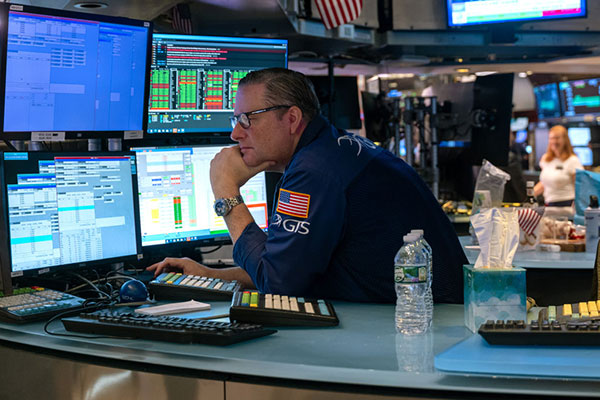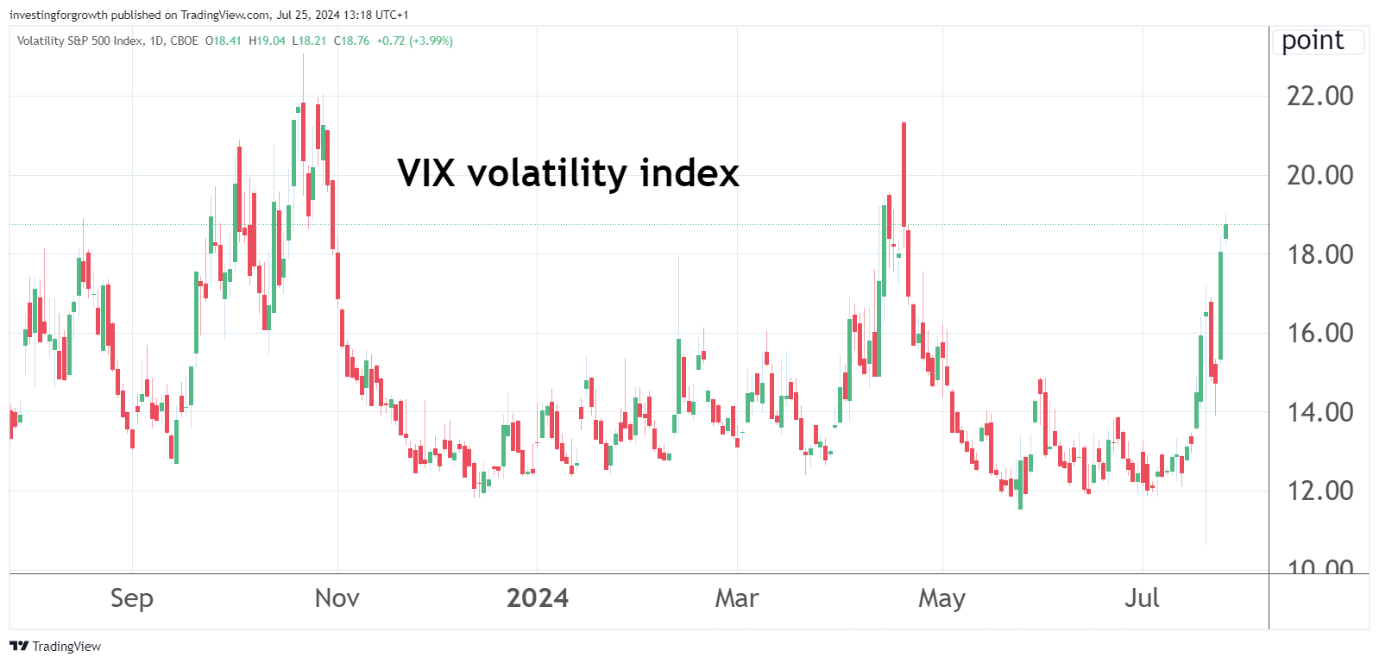Should we be worried about tech sector correction?
After America’s Magnificent Seven tech stocks just posted their worst day since September 2022, investors are asking whether this marks the end of the AI boom. Graeme Evans looks for answers.
25th July 2024 13:56
by Graeme Evans from interactive investor

A technical correction for the Magnificent Seven after 10-day declines of more than 15% for NVIDIA Corp (NASDAQ:NVDA) and Tesla Inc (NASDAQ:TSLA) is one of the biggest setbacks yet for Wall Street’s artificial intelligence (AI)-fuelled boom.
Stretched valuations on the back of this year's surge for the S&P 500 index have created a high bar for the current earnings season, which is about to reach a critical stage with figures due next week by the quartet of Apple Inc (NASDAQ:AAPL), Microsoft Corp (NASDAQ:MSFT), Meta Platforms Inc Class A (NASDAQ:META) and Amazon.com Inc (NASDAQ:AMZN).
- Invest with ii: Buy US Stocks & Shares | US Earnings Season | Interactive investor Offers
Questions over returns on AI capital expenditure and increased political uncertainty have added to pressure, particularly with a seasonally tougher stock market period just around the corner.
The earnings jitters have helped to push the VIX index of volatility up to its highest level since April when geopolitical tensions were at their peak in the Middle East.

Source: TradingView. Past performance is not a guide to future performance.
Results by Tesla and Alphabet Inc Class A (NASDAQ:GOOGL) sparked this week’s sharp downturn, with the electric car maker down 12% yesterday as weaker demand and the need to increase incentives for customers led to its lowest profit margin in more than five years.
Shares in Google parent company Alphabet fell 5% as better than expected second-quarter earnings were overshadowed by investor concerns over rising AI-related capital spending.
The selling meant the group of Magnificent Seven stocks posted its worst day since September 2022, with the 6% reverse leaving the band of mega-caps in technical correction territory following a fall of more than 10% from a record level just two weeks earlier.
- ii view: Google owner Alphabet delivers double-digit growth
- Top tech investor: ‘Big Five’ stock concentration risk is justified
Two of the tech sector’s worst performers of the past 10 sessions have been Tesla with a fall of 18% and Nvidia after a decline of 15%. Meta Platforms is down 14%, while ARM Holdings ADR (NASDAQ:ARM) is off 15% among others in the heavily sold semiconductors sector.
Last night’s Wall Street closing bell marked the first time in more than 350 trading sessions that the S&P 500 index had dropped by more than 2%. It follows a run of 28 positive weeks out of the past 37, which is the best showing in 35 years.
The performance of the equal-weighted S&P 500 was down only 1.2%, indicating that yesterday’s losses were not as widespread as they may first appear.
This mirrors hopes that the current results season will show the broadening of earnings growth beyond the Magnificent Seven, including the first expansion for the S&P 493 since 2022.
- ii view: is Tesla share slump a buying opportunity?
- eyeQ: a rare chance to buy this tech stock cheaply
- Sign up to our free newsletter for share, fund and trust ideas, and the latest news and analysis
Overall, Wall Street is hopeful that S&P 500 earnings per share can grow in the region of 10-12%. The fifth of companies to have reported by last Friday beat the consensus EPS by 5% in aggregate, driven by the financials sector.
For Bank of America analysts, the four lessons so far have been that the US consumer is slowing but stable, de-stocking is moderating, AI chip demand remains strong, and that capital markets activity has picked up.
Stock markets should also be supported by easier monetary policy, with slowing inflation allowing the Federal Reserve to cut rates at its September policy meeting.
UBS Global Wealth Management said today: “Investors should be prepared for periodic market dips. The equity market has come a long way, and both positioning and sentiment had become extended, in our view.
“However, we continue to expect the S&P 500 to recover and end the year higher at 5,900 versus the current 5,427. Easing monetary policy along with further build-out of AI infrastructure and applications should be supportive.”
These articles are provided for information purposes only. Occasionally, an opinion about whether to buy or sell a specific investment may be provided by third parties. The content is not intended to be a personal recommendation to buy or sell any financial instrument or product, or to adopt any investment strategy as it is not provided based on an assessment of your investing knowledge and experience, your financial situation or your investment objectives. The value of your investments, and the income derived from them, may go down as well as up. You may not get back all the money that you invest. The investments referred to in this article may not be suitable for all investors, and if in doubt, an investor should seek advice from a qualified investment adviser.
Full performance can be found on the company or index summary page on the interactive investor website. Simply click on the company's or index name highlighted in the article.